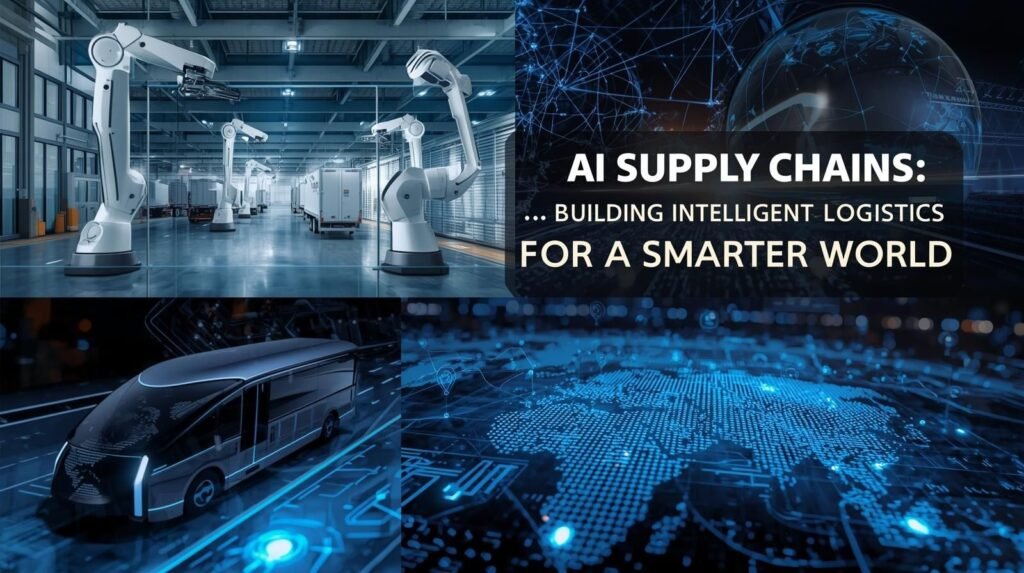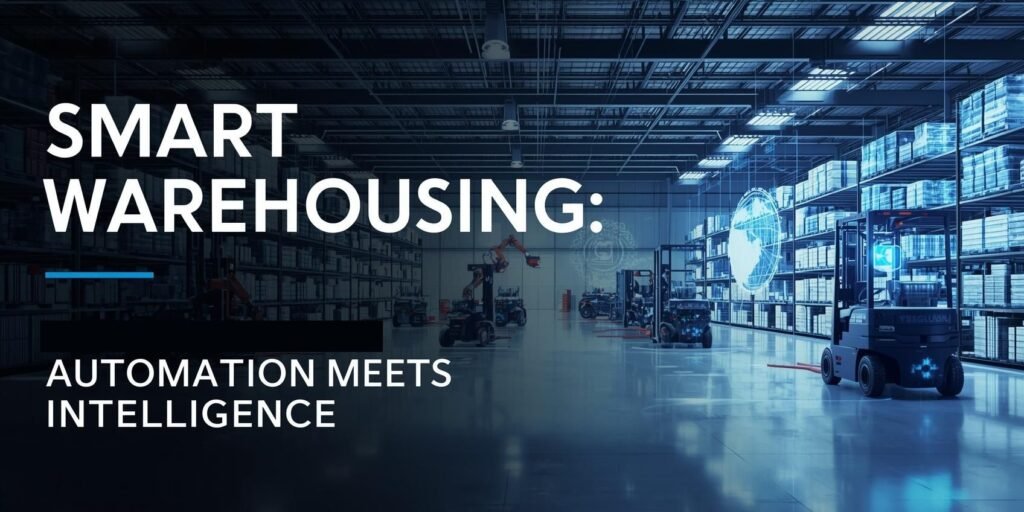
In the age of digital transformation, supply chains are no longer static networks of transportation, warehousing, and delivery. Instead, they are evolving into dynamic, intelligent ecosystems powered by artificial intelligence. The rise of AI supply chains management marks one of the most transformative shifts in global commerce. Companies are embracing machine learning, predictive analytics, and robotic automation to ensure faster, more resilient, and more sustainable logistics operations. At AixCircle, we believe this AI-driven revolution is not just enhancing efficiency but rewriting the rules of global trade itself.
The Era of Intelligent Supply Chains
The traditional supply chain has always relied heavily on manual processes, siloed data, and linear workflows. However, the complexity of today’s globalized economy has made those models obsolete. Businesses face challenges like fluctuating demand, geopolitical uncertainties, rising transportation costs, and supply disruptions. The introduction of AI in supply chain management provides the intelligence to anticipate these challenges and create smarter responses in real-time.
By integrating artificial intelligence into every node of logistics—from demand forecasting to last-mile delivery—organizations can achieve unprecedented agility. AI systems no longer just respond to problems; they proactively detect risks, optimize resources, and create adaptive supply chain frameworks. This shift lays the foundation for a new era of supply chain innovation where predictive insights and automation are as crucial as physical infrastructure.
Predictive Analytics: The Brain of Modern Logistics
One of the most disruptive trends reshaping the industry is the rise of predictive logistics AI. Instead of relying solely on historical data, predictive models analyze patterns in customer demand, seasonal trends, weather disruptions, and geopolitical events to anticipate challenges before they happen.
For example, retail companies can use predictive logistics AI to forecast holiday demand spikes weeks in advance, ensuring inventory levels are balanced across warehouses. Similarly, manufacturers can predict potential supplier delays and reroute sourcing strategies to minimize disruptions. The power of predictive intelligence lies in its ability to provide foresight—enabling businesses to act before inefficiencies arise.
At AixCircle, we see predictive models as the new nervous system of global supply chains, connecting diverse data streams into one unified decision-making framework. This ensures not only faster delivery but also a more resilient supply chain capable of withstanding shocks.
Smart Warehousing: Automation Meets Intelligence

Warehousing has always been a critical bottleneck in logistics. Manual labor, paperwork-heavy processes, and inefficient storage systems often slowed down operations. However, the rise of smart warehousing automation has completely transformed this landscape.
Today, AI-powered robots handle tasks such as sorting, packing, and transporting goods inside warehouses. These intelligent machines operate alongside human workers, ensuring 24/7 productivity and eliminating human error. More importantly, AI algorithms continuously analyze warehouse layouts and operations, making real-time adjustments that maximize space utilization and reduce bottlenecks.
The integration of smart warehousing automation means warehouses are no longer static storage facilities but active hubs of intelligence. With connected sensors, real-time tracking, and machine learning-driven optimization, warehouses now play a proactive role in shaping overall supply chain performance. AixCircle helps organizations harness these tools to create logistics systems that are faster, leaner, and more cost-efficient.
AI for Inventory Optimization: Balancing Demand and Supply
One of the most persistent challenges in logistics is maintaining the right balance between inventory levels and customer demand. Overstocking leads to increased holding costs, while understocking results in lost sales and dissatisfied customers. The emergence of AI for inventory optimization has solved this long-standing dilemma.
AI-driven inventory systems can process millions of data points, including sales patterns, lead times, supplier performance, and customer behavior, to recommend the optimal stock levels. Unlike traditional approaches that rely on fixed formulas, these systems continuously adapt to changing market conditions.
For instance, an e-commerce business can use AI for inventory optimization to anticipate product surges during seasonal promotions, ensuring stock availability without inflating costs. Manufacturers can use the same intelligence to streamline production schedules and avoid material shortages. At AixCircle, we emphasize this balance as the foundation of supply chain resilience—allowing businesses to meet demand efficiently while reducing waste.
Redefining Efficiency Through Supply Chain Innovation
The integration of AI across logistics operations is not just about solving isolated problems—it represents a larger wave of supply chain innovation. From blockchain integration for transparent tracking to AI-enabled sustainability strategies that reduce carbon footprints, innovation is redefining how global supply chains operate.
For example, AI-powered route optimization reduces fuel consumption by ensuring trucks travel the most efficient paths. Similarly, intelligent demand planning minimizes resource waste, aligning production with actual consumption needs. This broader supply chain innovation creates value across industries, helping businesses achieve sustainability, profitability, and resilience simultaneously.
AixCircle champions this transformation by helping businesses integrate AI technologies holistically, ensuring that innovation is not just a buzzword but a measurable strategy for long-term growth.
Human-AI Collaboration in Supply Chains
One of the misconceptions about automation is that it replaces humans entirely. In reality, the future of AI supply chains management is not human replacement but human-AI collaboration. Workers are freed from repetitive, labor-intensive tasks and empowered to focus on strategic, creative, and analytical responsibilities.
For instance, warehouse employees can supervise robotic systems while focusing on customer service and process improvement. Managers can leverage predictive analytics to make informed strategic decisions instead of spending hours collecting data. Smart warehousing automation and AI for inventory optimization complement human skills, creating a workforce that is more empowered and less burdened.
At AixCircle, we believe the greatest value of AI lies in its ability to enhance human potential, turning logistics professionals into decision-makers who drive efficiency and innovation.
Building Resilience in a Volatile World
Global supply chains are increasingly vulnerable to disruptions caused by pandemics, political conflicts, climate change, and economic fluctuations. Traditional risk management models often fail to adapt to such volatility. The deployment of predictive logistics AI provides businesses with resilience by enabling early detection of risks and faster response strategies.
For example, if a natural disaster disrupts a shipping route, AI systems can immediately identify alternative transportation methods and adjust delivery timelines. Similarly, AI supply chains management ensures visibility across the entire ecosystem, from raw material sourcing to final delivery. This holistic visibility allows businesses to remain agile and competitive in uncertain environments.
At AixCircle, we see resilience as the ultimate outcome of supply chain intelligence—helping businesses not only survive disruptions but thrive amidst them.
Sustainability Through Intelligent Logistics
Sustainability is no longer optional; it is a core requirement for businesses operating in a socially conscious global economy. AI is becoming a critical enabler of sustainable supply chains. Through supply chain innovation, organizations can monitor energy consumption, reduce emissions, and minimize waste.
AI-powered tools optimize packaging to reduce material use, calculate carbon emissions for different shipping routes, and recommend greener alternatives. With AI for inventory optimization, companies can reduce overproduction and unsold stock—both major contributors to waste. Similarly, smart warehousing automation ensures resources are used efficiently, with less reliance on energy-intensive manual labor.
AixCircle is committed to helping businesses align profitability with environmental responsibility, showcasing how AI-driven logistics can build a smarter, greener world.
The Future Outlook of AI-Driven Logistics
As technology advances, the scope of AI supply chains management will expand even further. We are entering an era where fully autonomous logistics ecosystems will become a reality. Autonomous delivery drones, AI-managed ports, and blockchain-integrated trade systems will redefine what efficiency means.
The future will also witness greater personalization in logistics, where predictive models adjust supply chains based on individual customer preferences. Similarly, real-time AI-driven sustainability tracking will allow companies to meet regulatory compliance while strengthening brand reputation.
At AixCircle, we envision a future where supply chains are not just support systems but strategic assets that drive innovation, resilience, and global connectivity.
Conclusion
The transformation of global logistics is not a distant possibility—it is happening now. The rise of predictive logistics AI, smart warehousing automation, AI for inventory optimization, and broader supply chain innovation has turned supply chains into intelligent, adaptive ecosystems. Businesses that embrace this shift will not only gain a competitive advantage but also build resilience, efficiency, and sustainability into their operations.
At AixCircle, we are at the forefront of this revolution, helping organizations navigate the complexities of AI-driven logistics. By integrating advanced tools and strategies, we empower businesses to unlock the full potential of AI supply chains management—creating intelligent logistics networks that define the smarter world of tomorrow.

